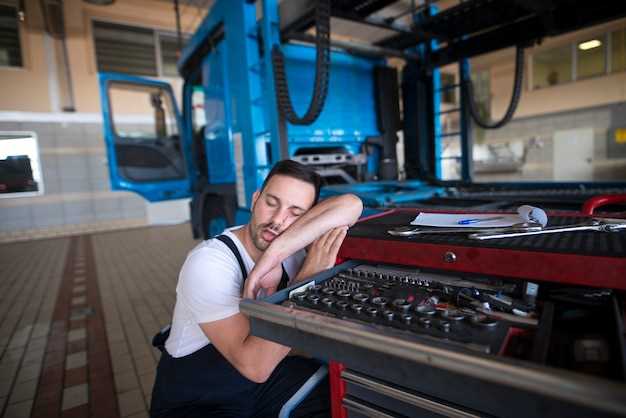
Embarking on a career as a truck racer is an exciting journey that blends passion for motorsports with the thrill of competition. To succeed in this demanding field, aspiring racers must understand the skills required and the path they must take to refine these abilities. The world of truck racing is not just about speed; it also involves strategy, teamwork, and a deep knowledge of vehicle dynamics.
Building the necessary skills for truck racing begins with a solid foundation in driving techniques. This includes mastering vehicle control under various conditions, understanding the intricacies of truck handling, and developing quick reflexes. Additionally, aspiring racers must engage in rigorous physical training to enhance endurance and strength, as these factors are critical during high-pressure races.
Experience plays a pivotal role in shaping a successful truck racer. Gaining seat time in various racing environments allows drivers to adapt to different tracks and conditions while learning how to manage the unique challenges that come with racing large vehicles. The path to becoming a professional truck racer is often lined with challenges, but dedication to continuous improvement and relentless practice can lead to extraordinary achievements in this thrilling sport.
Becoming a Truck Racer: Skills, Experience, and Training

Truck racing is an exhilarating sport that requires a unique blend of skills and experience. To succeed in this demanding environment, aspiring racers must navigate a challenging path that combines technical knowledge, physical prowess, and mental fortitude.
Essential skills for truck racing include exceptional driving abilities, deep understanding of vehicle mechanics, and awareness of racing strategies. Effective communication and teamwork are also critical, especially when working with a pit crew. Racers must learn to analyze track conditions and adapt to various weather scenarios, enhancing their ability to make split-second decisions.
| Skill | Description |
|---|---|
| Driving Technique | Mastering accelerations, braking, and cornering specific to truck dynamics. |
| Vehicle Knowledge | Understanding truck mechanics and performance tuning for optimal racing. |
| Strategic Thinking | Planning overtakes and pit stops while anticipating competitor actions. |
| Physical Fitness | Maintaining strength and endurance to handle demanding race conditions. |
| Team Collaboration | Working effectively with the crew to ensure the truck is race-ready. |
Experience in motorsports provides a valuable foundation for those venturing into truck racing. Many successful racers begin their journeys in karting or other forms of racing, gradually progressing to larger vehicles. Participating in local races helps newcomers gain practical experience and develop their driving skills on various types of tracks.
Training for truck racing typically involves intensive practice sessions that hone driving techniques, along with physical conditioning to enhance stamina and strength. Many racers also benefit from attending racing schools, where they receive tailored guidance from industry professionals, covering both driving tactics and vehicle handling.
By focusing on these essential skills and experiences, aspiring truck racers can carve out a promising path in the exciting world of truck racing. Dedication to training and continuous learning will ultimately lead to success on the racetrack.
Mastering the Techniques: Key Skills for Truck Racing
Truck racing is an exhilarating sport that requires a unique set of skills. To excel, drivers must master various techniques that enhance their performance on the track. The path to becoming a successful truck racer involves honing these essential abilities.
Firstly, understanding vehicle dynamics is crucial. Drivers must learn how their truck behaves under different conditions, including acceleration, braking, and cornering. Mastery of weight transfer techniques allows competitors to maintain control while navigating sharp turns, maximizing speed without sacrificing safety.
Another critical skill is precision driving. Maintaining an ideal racing line minimizes lap times and enhances overall efficiency. Effective visual skills play a significant role; racers must anticipate track changes and competitor movements to make informed decisions quickly.
Additionally, physical endurance is vital. Long races demand sustained concentration and strength. Regular fitness training focusing on core stability, reflexes, and stamina can provide a competitive edge. Mental preparation, including strategies for stress management during races, also contributes to peak performance.
Finally, teamwork and communication with pit crews cannot be overlooked. Successful pit stops and strategic planning during the race rely on clear and effective communication. Understanding how to interact with the team enhances overall racing strategy and execution.
In summary, mastering the key skills of vehicle dynamics, precision driving, physical endurance, and effective communication forms the foundation for any aspiring truck racer. By actively training and refining these techniques, drivers can pave their way to success on the racing circuit.
Gaining Experience: Pathways to Professional Racing

Embarking on a journey to become a professional truck racer requires a blend of skills, dedication, and practical experience. One of the most effective pathways to gain the necessary expertise is through grassroots racing series. These local competitions allow newcomers to hone their racing abilities while receiving real-time feedback on their performance.
Participating in karting leagues is another strategic step. Karting helps develop essential racing techniques such as braking, cornering, and throttle control, laying the groundwork for more complex vehicles. Competitors can learn how to handle pressure and race against others, essential for improvement.
Another viable path is to seek internships or support roles within racing teams. By becoming involved behind the scenes, aspiring truck racers can absorb knowledge about vehicle mechanics, team dynamics, and racing strategies. This insider experience can provide a comprehensive understanding of the racing world.
Driving schools specifically tailored for truck racing offer structured programs where participants can receive professional instruction. These schools often feature simulators and actual track time, allowing students to focus on developing specific skills in a controlled environment.
Networking is vital. Building relationships with current racers, teams, and sponsors can open doors to sponsorship opportunities and mentorship, which are crucial for those pursuing a career in racing. These connections can provide insights on how to navigate the complexities of the sport.
Finally, participating in amateur racing leagues or regional championships can bridge the gap to professional racing. It allows drivers to gain exposure, practice their skills under competition conditions, and potentially catch the eye of talent scouts seeking new racers. Committing to a pathway that emphasizes learning through diverse experiences is essential for achieving success in the competitive world of truck racing.
Training Regimens: Preparing Physically and Mentally for the Track
Embarking on a career in truck racing requires a comprehensive approach to training that addresses both physical fitness and mental readiness. The path to success involves developing specific skills and endurance that can withstand the rigors of competitive racing.
Physical Training
To excel in truck racing, drivers must maintain peak physical condition. Here are essential components of a physical training regimen:
- Strength Training: Focus on core and upper body strength to handle the weight and power of the truck.
- Cardiovascular Fitness: Engage in activities like running or cycling to build stamina for long races.
- Agility Drills: Incorporate exercises that improve reaction times and maneuverability.
- Flexibility Exercises: Regular stretching helps prevent injuries and aids in maintaining proper driving posture.
Nutrition
A balanced diet is crucial for sustaining energy levels during training and racing:
- Hydration: Adequate fluid intake is necessary to maintain concentration and performance.
- Nutrient-Rich Foods: Focus on lean proteins, complex carbohydrates, and healthy fats to fuel the body.
Mental Training
Equally important is the mental aspect of racing. Mental preparation can be developed through:
- Visualization Techniques: Practicing race scenarios in your mind enhances focus and reduces anxiety.
- Mindfulness and Relaxation: Techniques such as meditation or yoga can improve concentration and calm nerves.
- Simulated Racing: Using racing simulators helps develop quick decision-making skills and track familiarity.
Rest and Recovery
Recovery is a vital part of any training regimen. It allows the body to heal and adapt:
- Sleep: Prioritize quality sleep for mental clarity and physical recovery.
- Active Recovery: Engage in low-intensity activities to promote blood flow and recovery without strain.
In conclusion, a successful truck racing career demands a dedicated training regimen that balances physical conditioning and mental preparation. By following a well-structured plan, aspiring racers can develop the essential skills needed to thrive on the track.




